Abstract
Herpes-zoster is caused by the reactivation of varicella-zoster virus (VZV). In this paper different hypotheses of how this re-emergence of virus comes about are reviewed and discussed. From these hypotheses, and epidemiological data describing the initial transmission of the virus, a mathematical model of primary disease (varicella) and reactivated disease (zoster) in developed countries is derived. The steady-state age distributions of zoster cases predicted by this model are compared with the observed distribution, derived from a review and analysis of published epidemiological data. The model allows differentiation between published hypotheses in which age of host may or may not influence the probability of viral reactivation. The results indicate that the probability of reactivation must increase with age to allow the observed pattern of zoster cases. The basic mathematical model presented provides a conceptual framework, which may be extended to assess possible control programmes.
Full text
PDF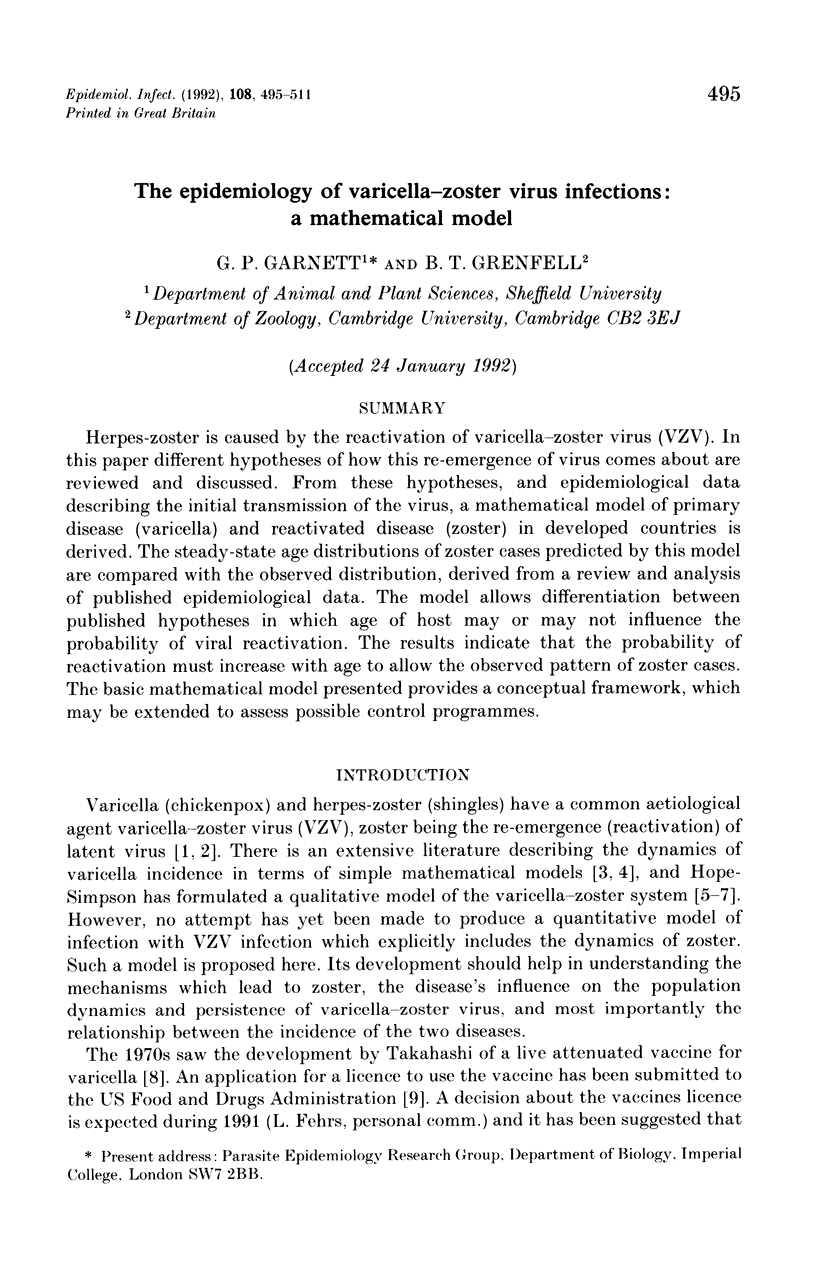
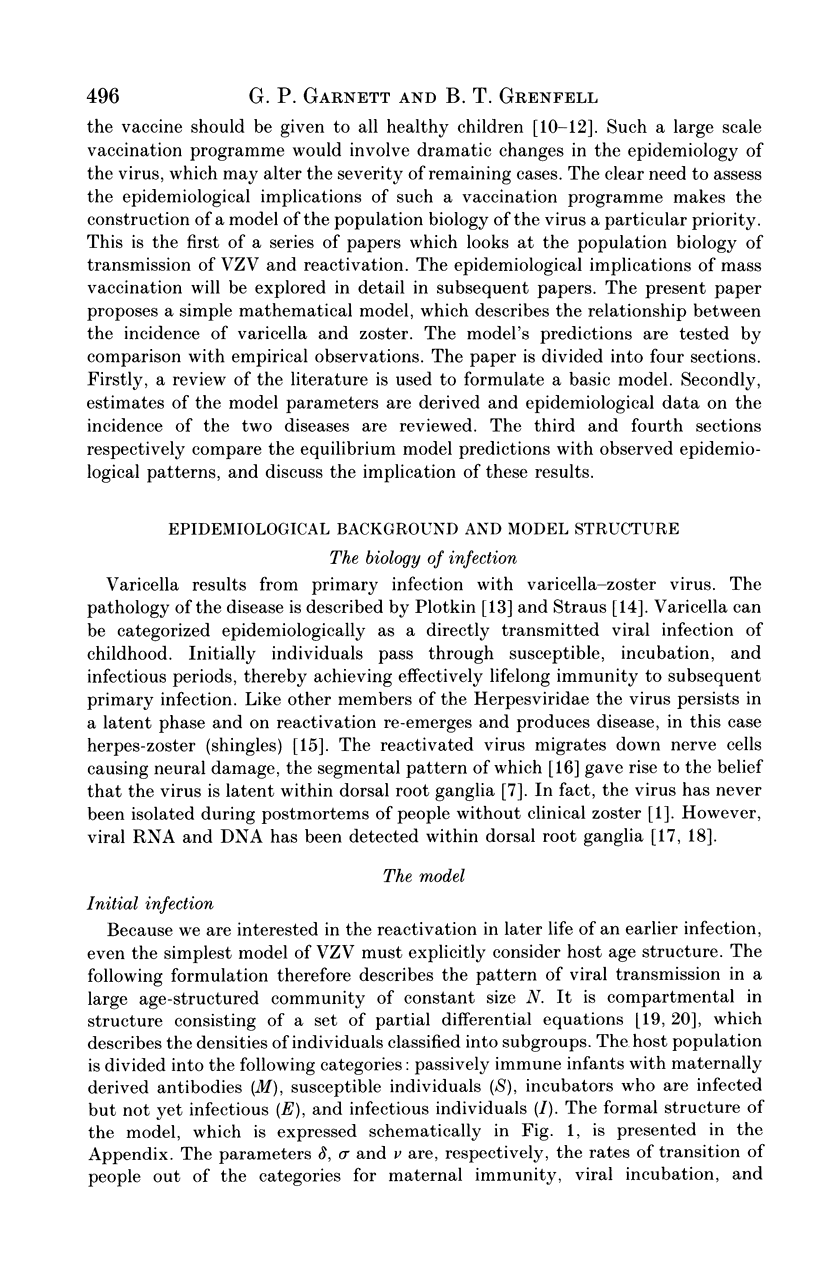
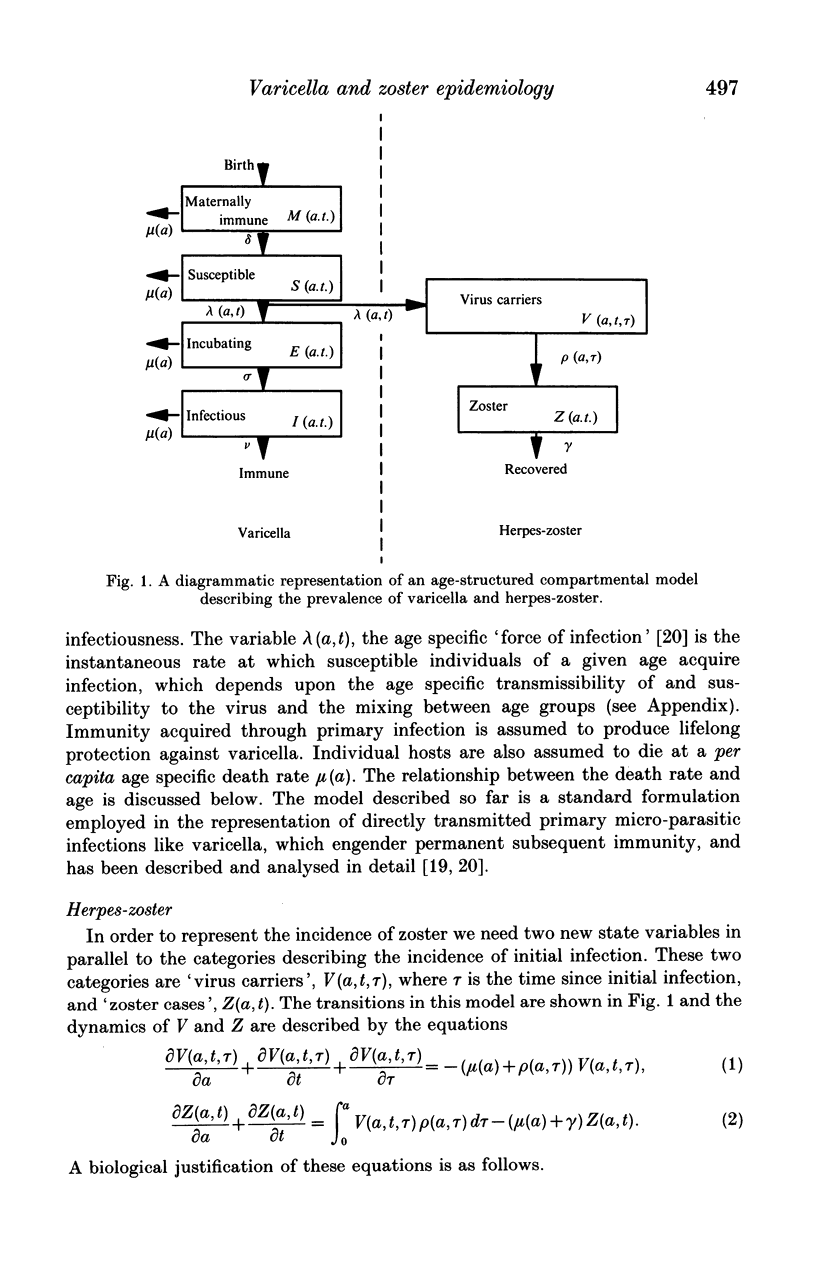
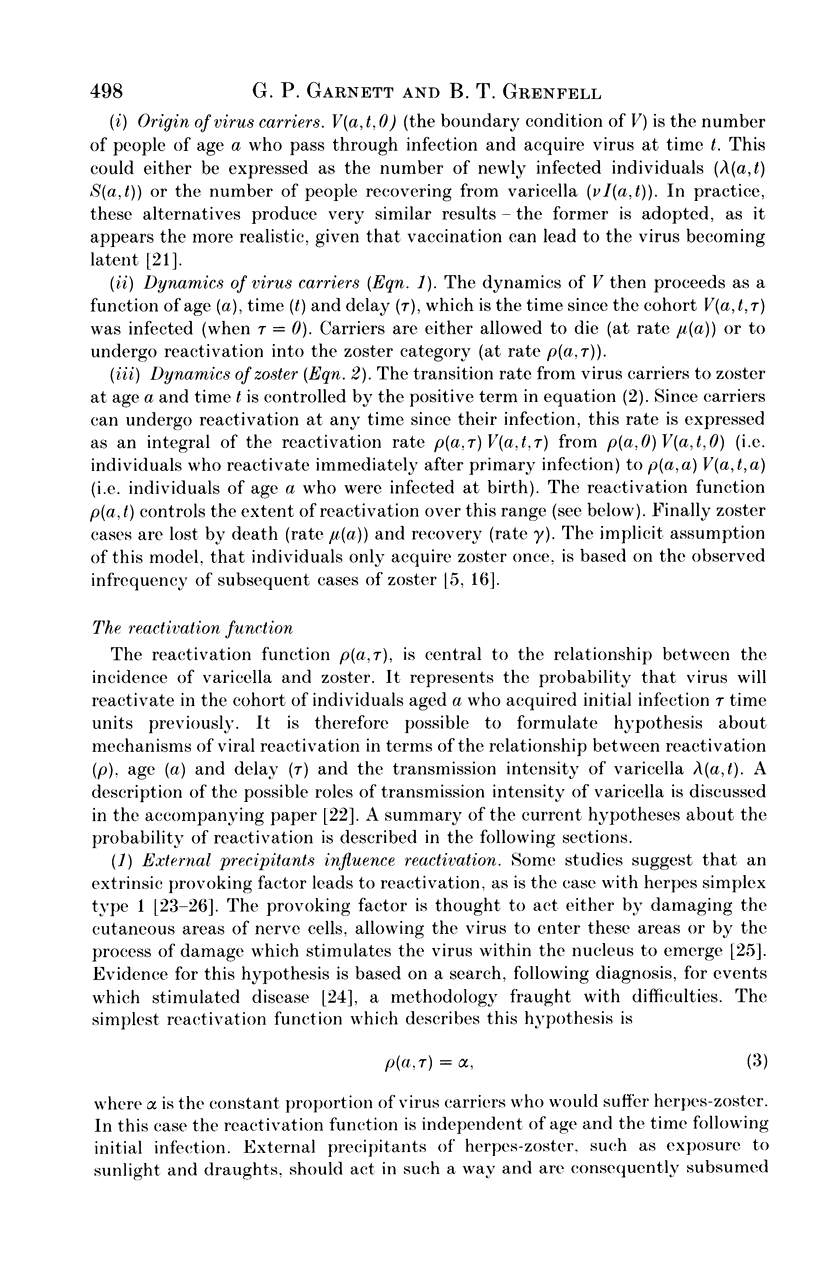
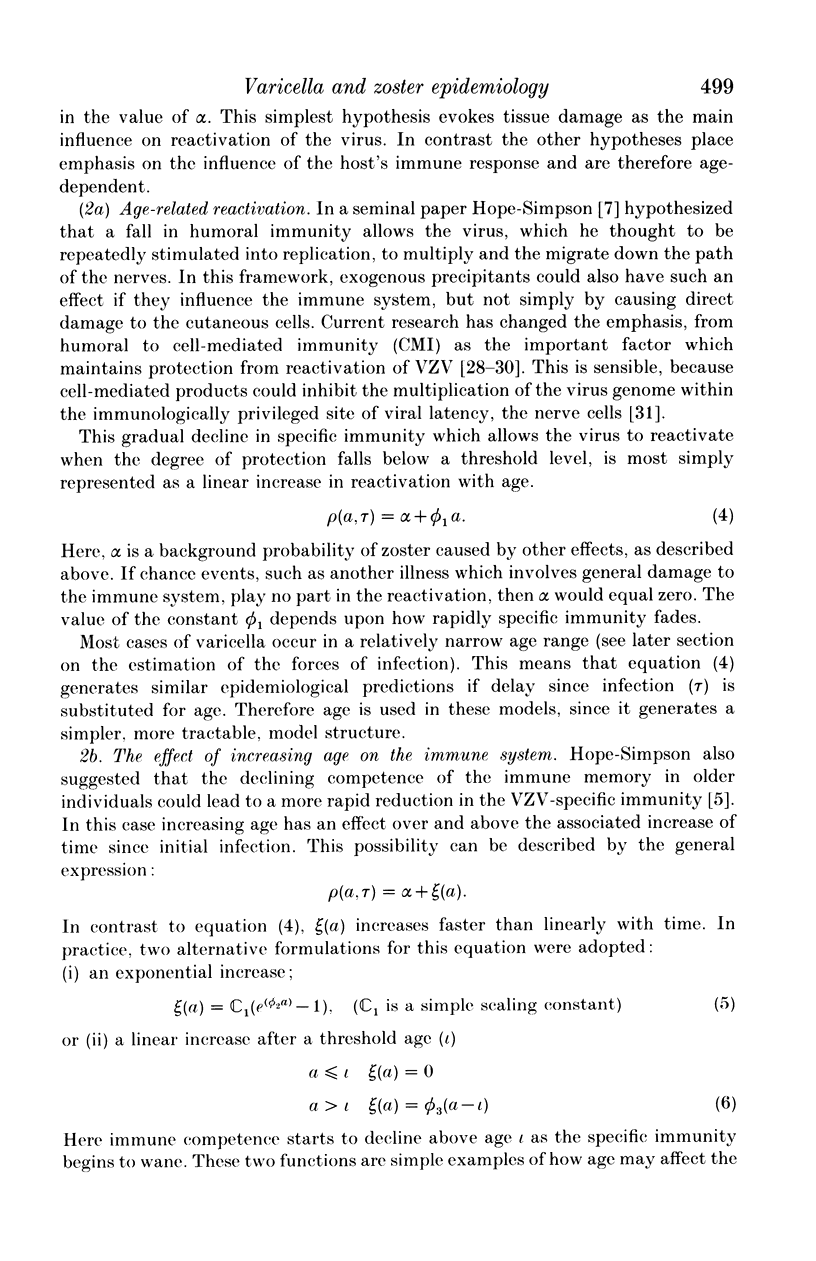
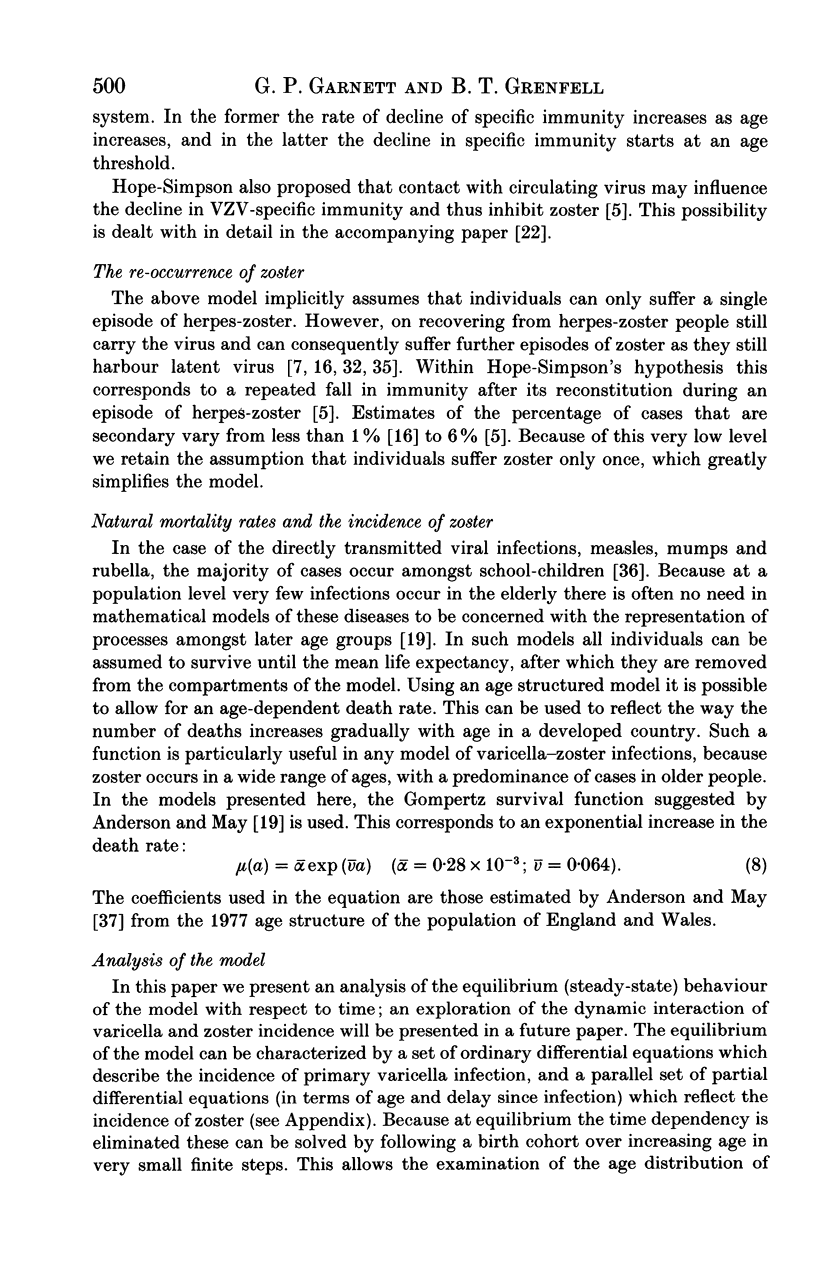
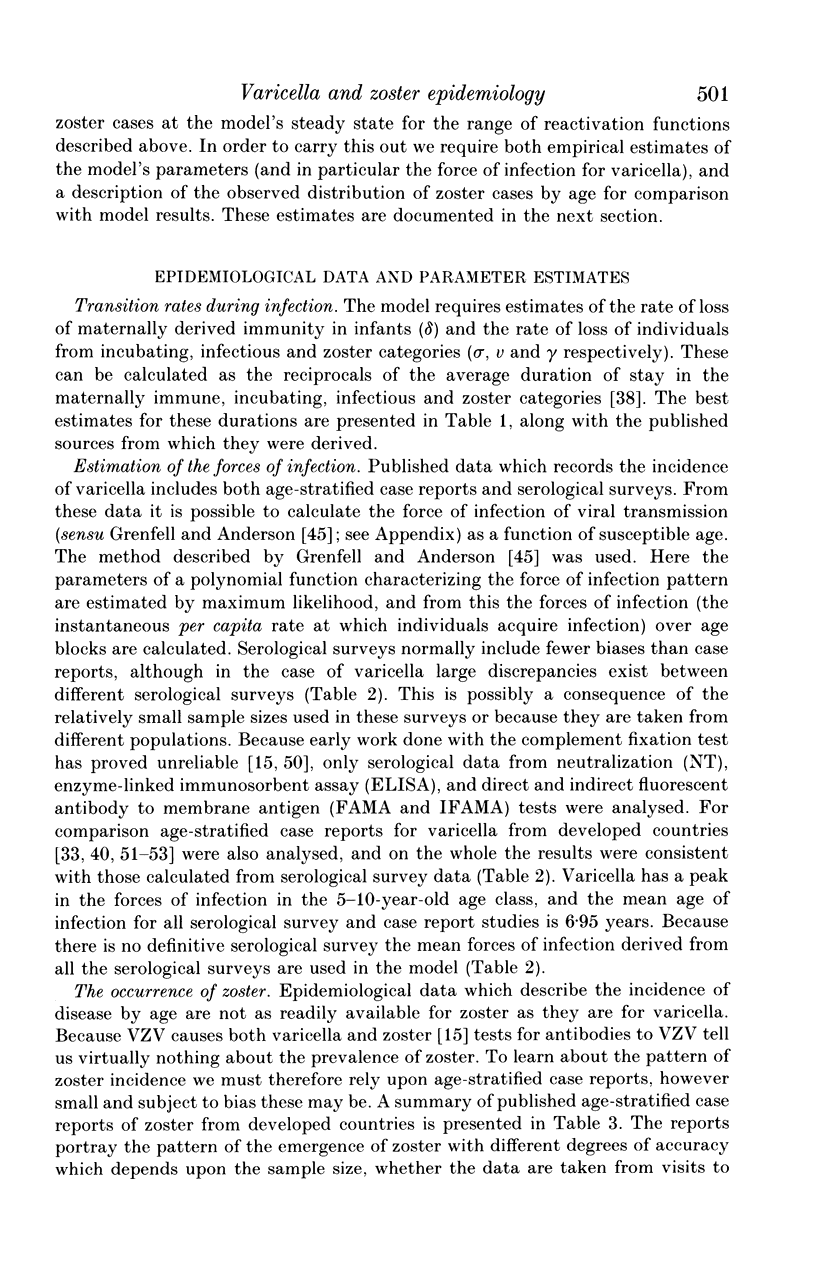
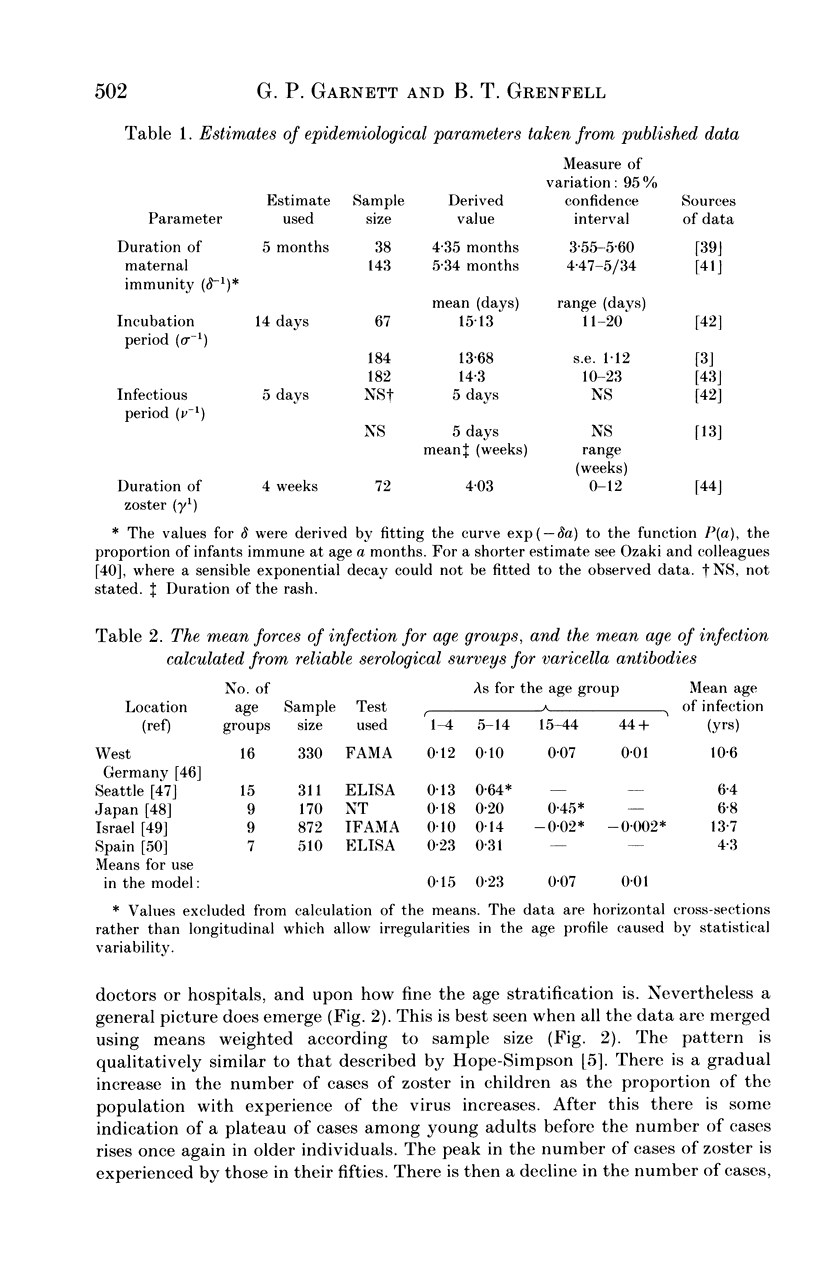
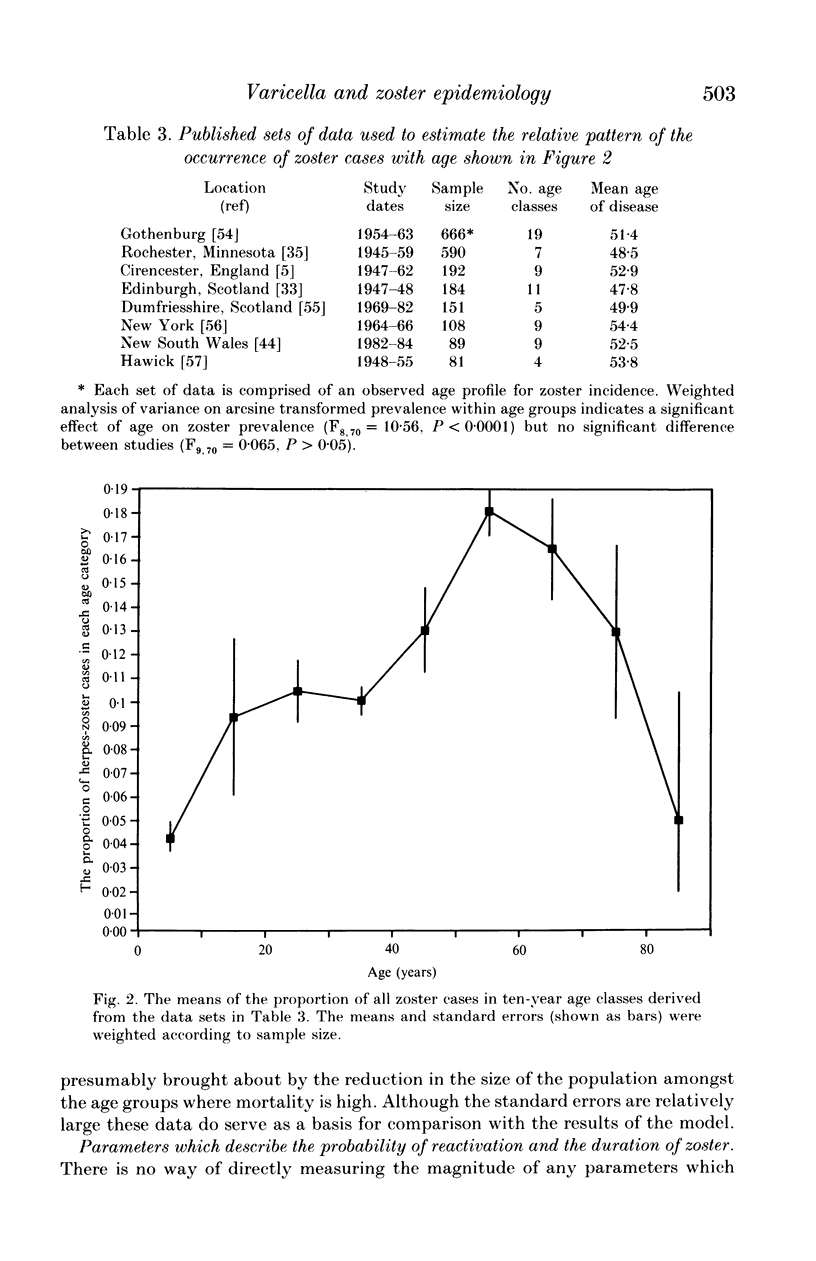
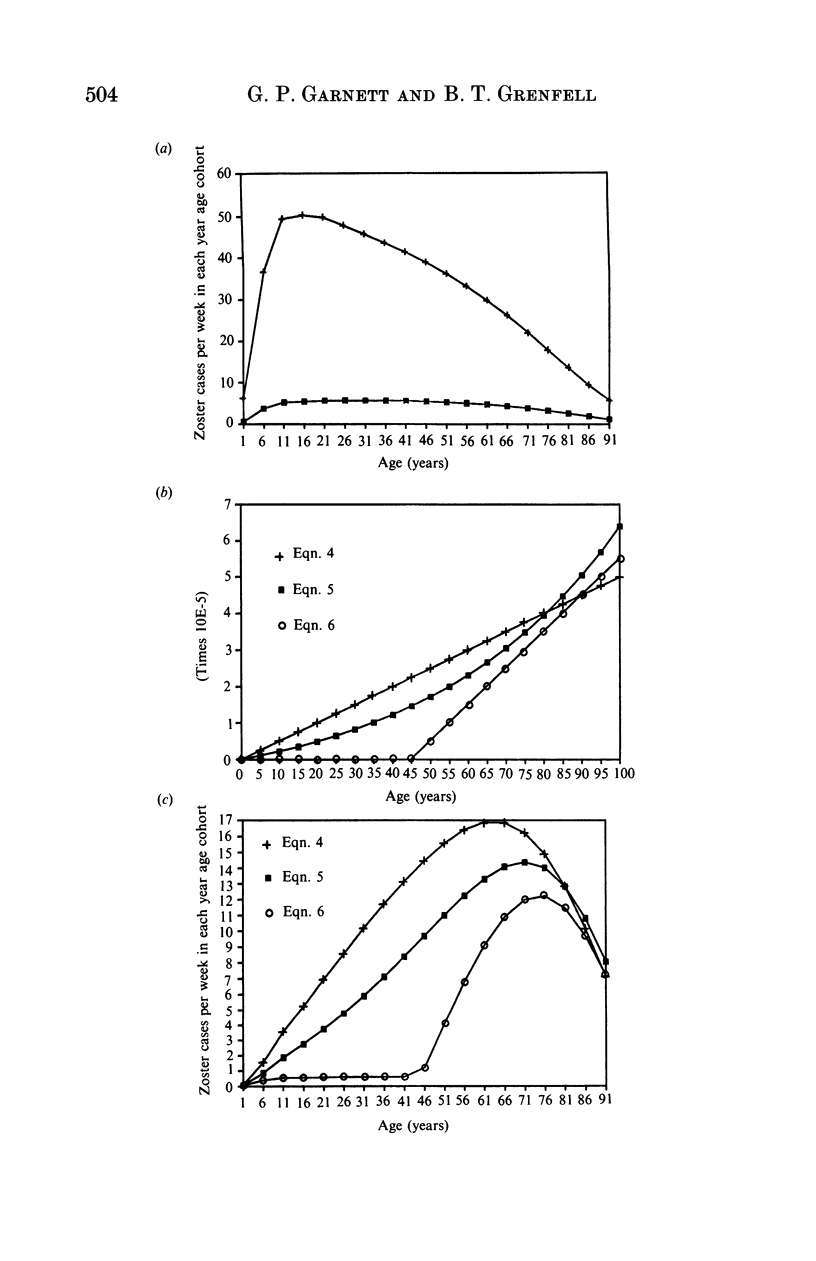
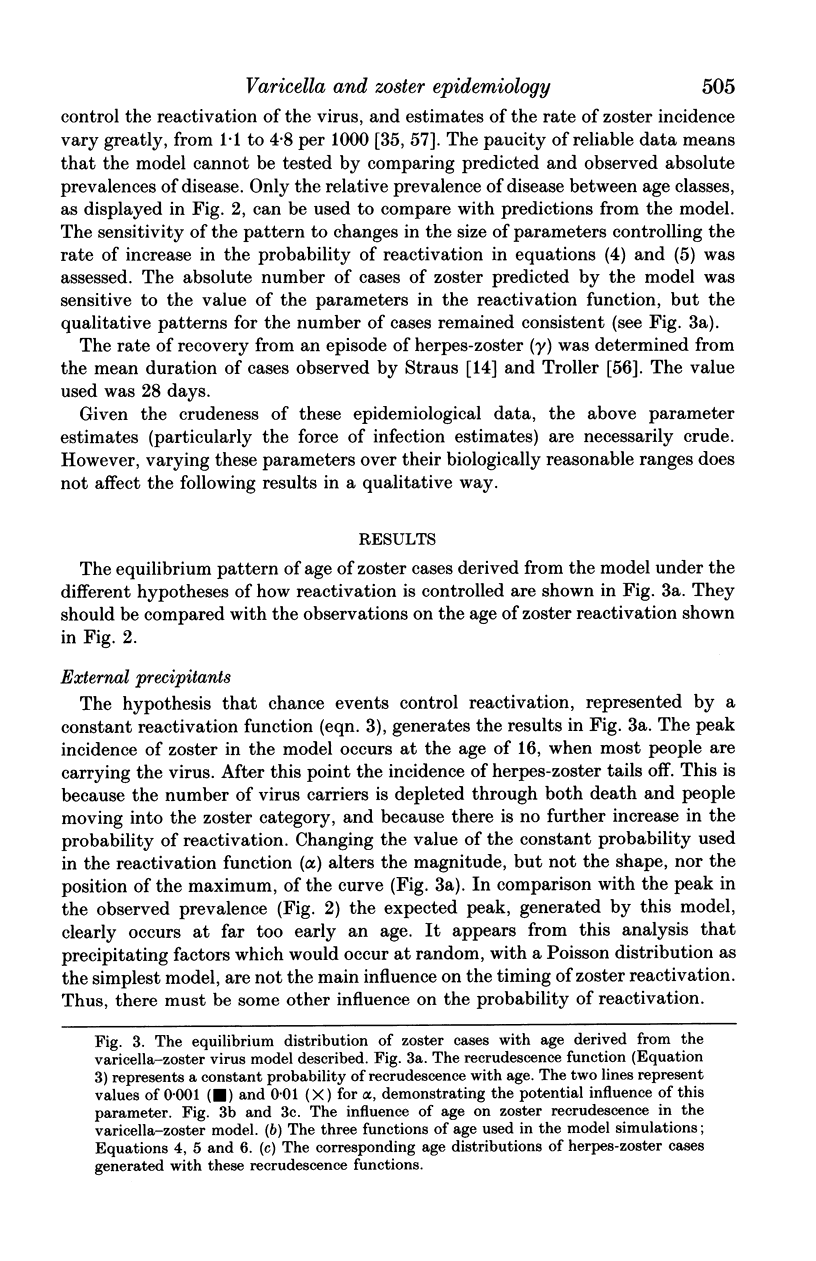
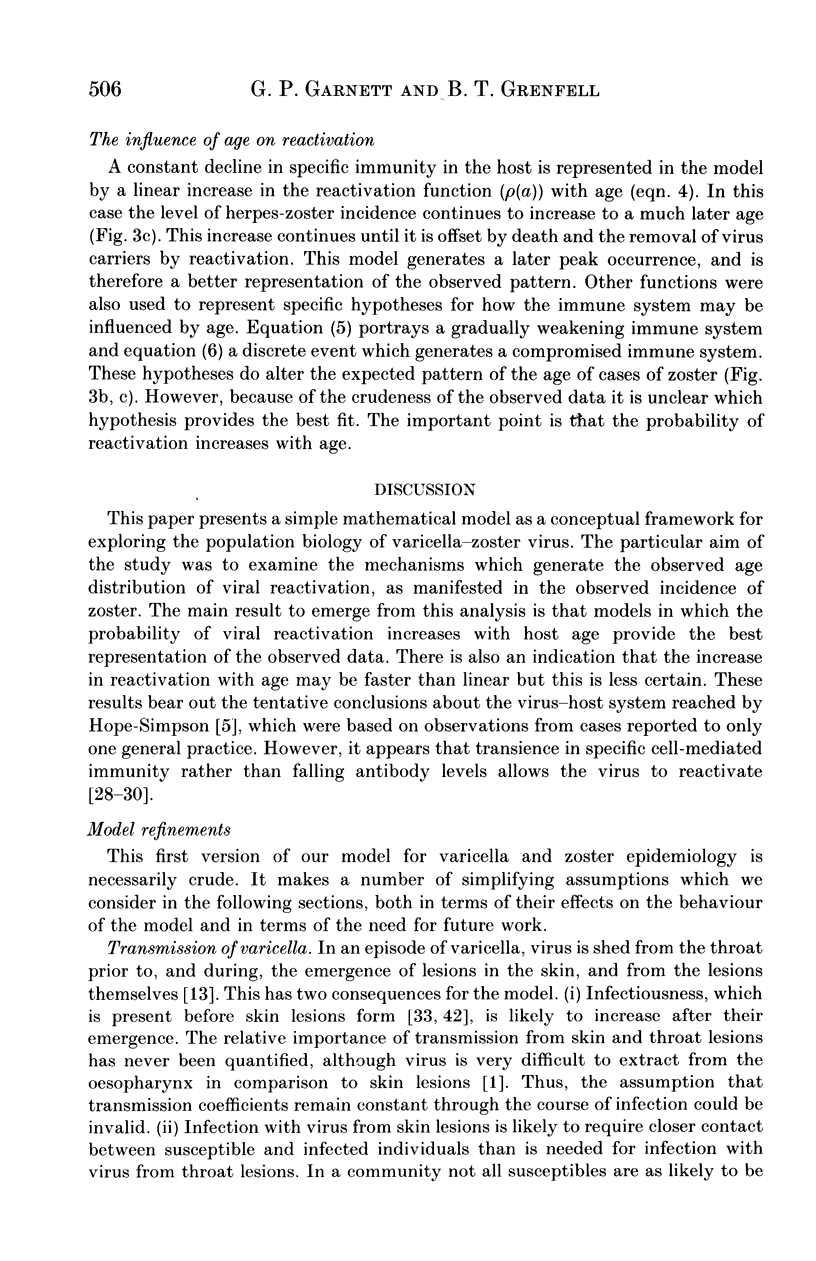
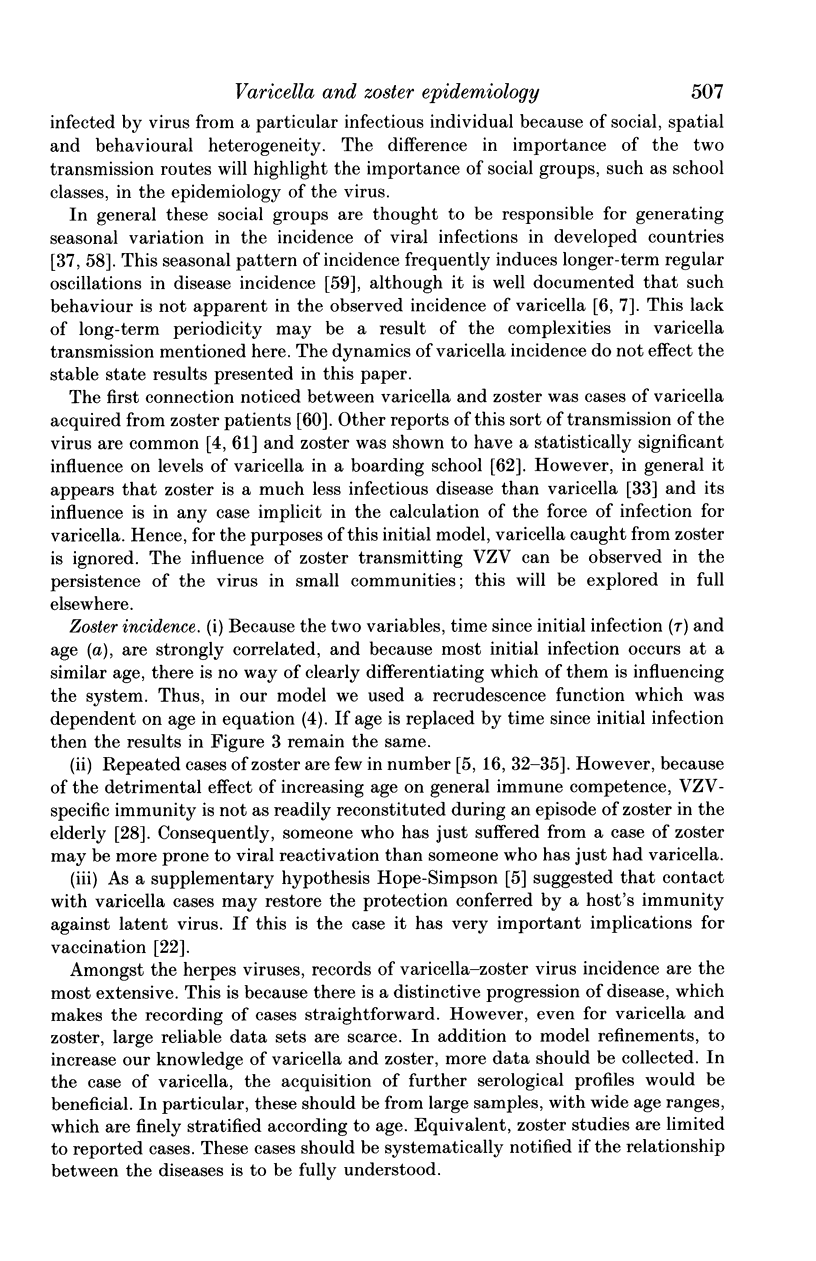
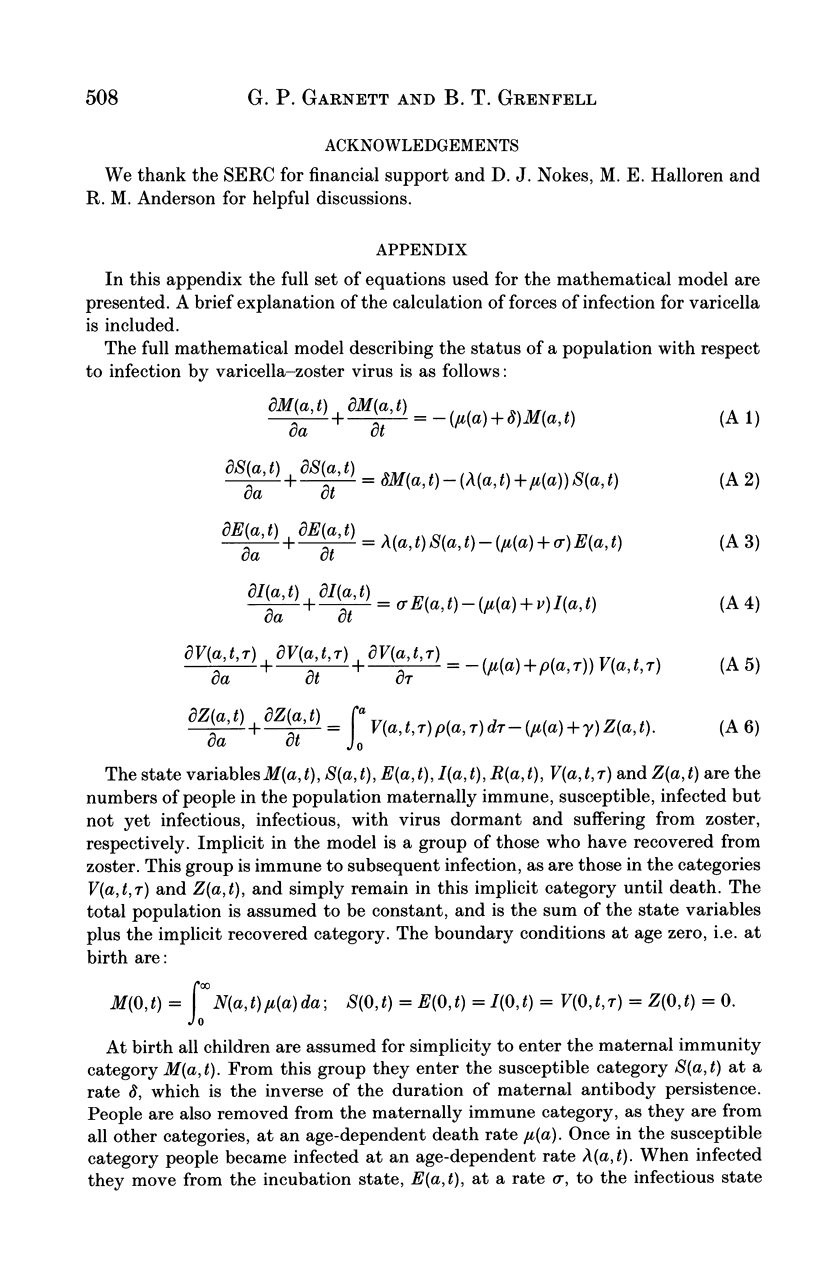
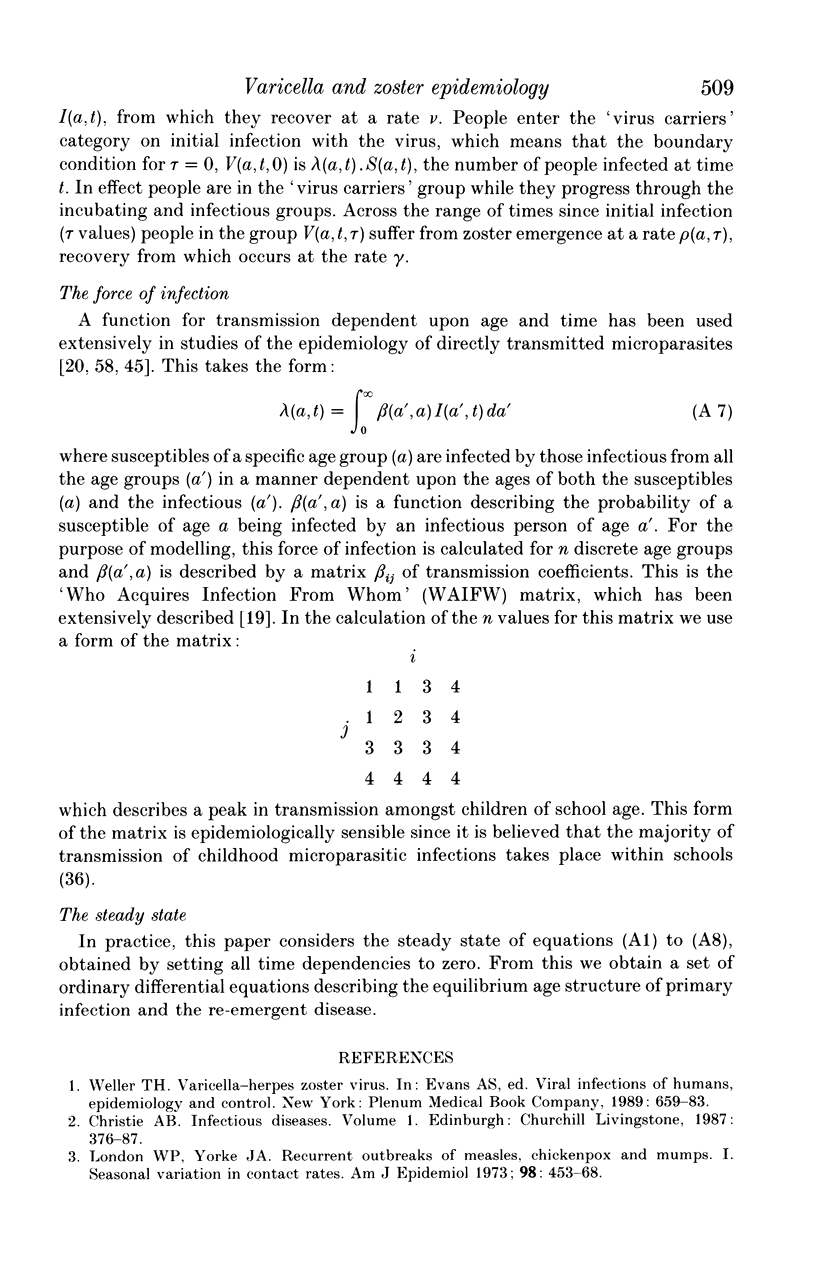
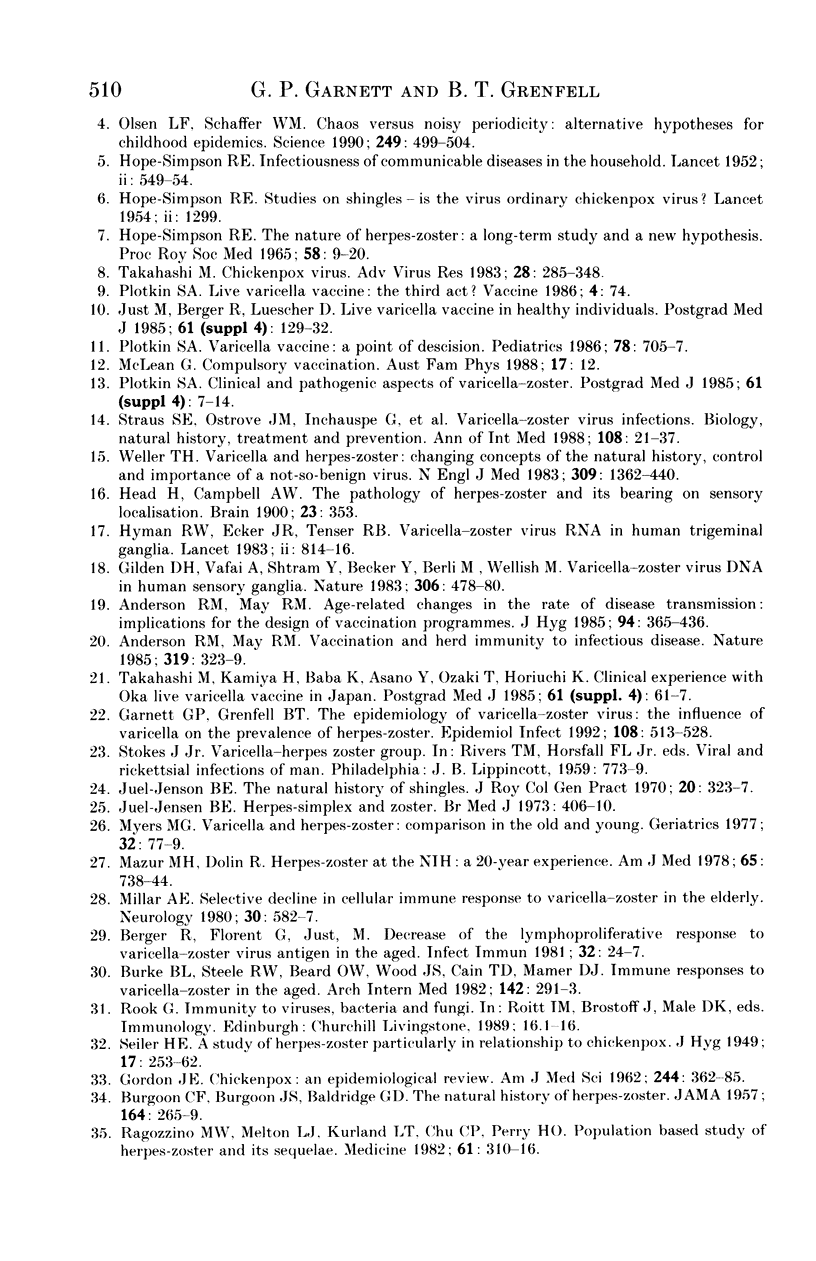
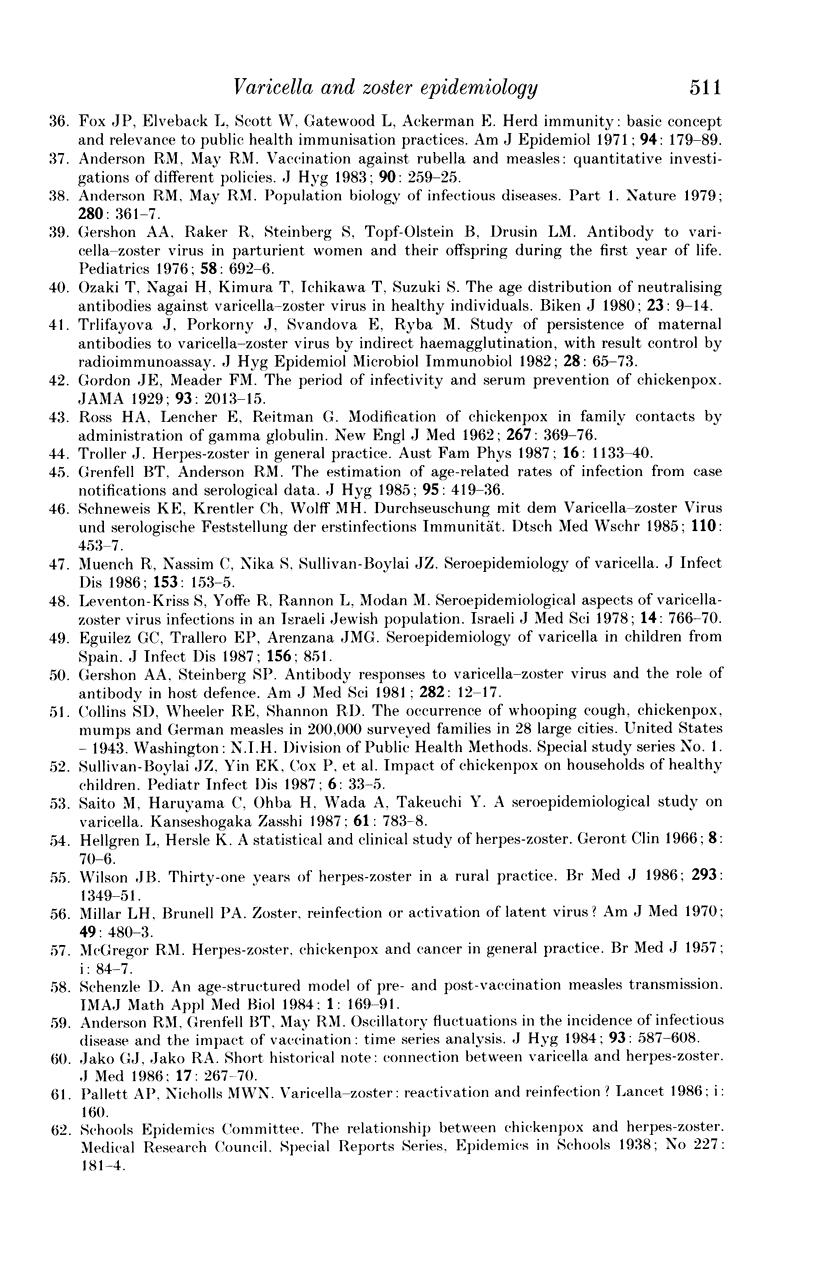
Selected References
These references are in PubMed. This may not be the complete list of references from this article.
- Anderson R. M., Grenfell B. T., May R. M. Oscillatory fluctuations in the incidence of infectious disease and the impact of vaccination: time series analysis. J Hyg (Lond) 1984 Dec;93(3):587–608. doi: 10.1017/s0022172400065177. [DOI] [PMC free article] [PubMed] [Google Scholar]
- Anderson R. M., May R. M. Age-related changes in the rate of disease transmission: implications for the design of vaccination programmes. J Hyg (Lond) 1985 Jun;94(3):365–436. doi: 10.1017/s002217240006160x. [DOI] [PMC free article] [PubMed] [Google Scholar]
- Anderson R. M., May R. M. Population biology of infectious diseases: Part I. Nature. 1979 Aug 2;280(5721):361–367. doi: 10.1038/280361a0. [DOI] [PubMed] [Google Scholar]
- Anderson R. M., May R. M. Vaccination against rubella and measles: quantitative investigations of different policies. J Hyg (Lond) 1983 Apr;90(2):259–325. doi: 10.1017/s002217240002893x. [DOI] [PMC free article] [PubMed] [Google Scholar]
- Anderson R. M., May R. M. Vaccination and herd immunity to infectious diseases. 1985 Nov 28-Dec 4Nature. 318(6044):323–329. doi: 10.1038/318323a0. [DOI] [PubMed] [Google Scholar]
- BURGOON C. F., Jr, BURGOON J. S., BALDRIDGE G. D. The natural history of herpes zoster. J Am Med Assoc. 1957 May 18;164(3):265–269. doi: 10.1001/jama.1957.02980030041010. [DOI] [PubMed] [Google Scholar]
- Berger R., Florent G., Just M. Decrease of the lymphoproliferative response to varicella-zoster virus antigen in the aged. Infect Immun. 1981 Apr;32(1):24–27. doi: 10.1128/iai.32.1.24-27.1981. [DOI] [PMC free article] [PubMed] [Google Scholar]
- Burke B. L., Steele R. W., Beard O. W., Wood J. S., Cain T. D., Marmer D. J. Immune responses to varicella-zoster in the aged. Arch Intern Med. 1982 Feb;142(2):291–293. [PubMed] [Google Scholar]
- Cilla Eguiluz G., Perez Trallero E., García Arenzana J. M. Seroepidemiology of varicella in children from Spain. J Infect Dis. 1987 Nov;156(5):851–851. doi: 10.1093/infdis/156.5.851. [DOI] [PubMed] [Google Scholar]
- Fox J. P., Elveback L., Scott W., Gatewood L., Ackerman E. Herd immunity: basic concept and relevance to public health immunization practices. Am J Epidemiol. 1971 Sep;94(3):179–189. doi: 10.1093/oxfordjournals.aje.a121310. [DOI] [PubMed] [Google Scholar]
- GORDON J. E. Chickenpox: an epidemiological review. Am J Med Sci. 1962 Sep;244:362–389. [PubMed] [Google Scholar]
- Garnett G. P., Grenfell B. T. The epidemiology of varicella-zoster virus infections: the influence of varicella on the prevalence of herpes zoster. Epidemiol Infect. 1992 Jun;108(3):513–528. doi: 10.1017/s0950268800050019. [DOI] [PMC free article] [PubMed] [Google Scholar]
- Gershon A. A., Raker R., Steinberg S., Topf-Olstein B., Drusin L. M. Antibody to Varicella-Zoster virus in parturient women and their offspring during the first year of life. Pediatrics. 1976 Nov;58(5):692–696. [PubMed] [Google Scholar]
- Gershon A. A., Steinberg S. P. Antibody responses to varicella-zoster virus and the role of antibody in host defense. Am J Med Sci. 1981 Jul-Aug;282(1):12–17. doi: 10.1097/00000441-198107000-00002. [DOI] [PubMed] [Google Scholar]
- Gilden D. H., Vafai A., Shtram Y., Becker Y., Devlin M., Wellish M. Varicella-zoster virus DNA in human sensory ganglia. Nature. 1983 Dec 1;306(5942):478–480. doi: 10.1038/306478a0. [DOI] [PubMed] [Google Scholar]
- Grenfell B. T., Anderson R. M. The estimation of age-related rates of infection from case notifications and serological data. J Hyg (Lond) 1985 Oct;95(2):419–436. doi: 10.1017/s0022172400062859. [DOI] [PMC free article] [PubMed] [Google Scholar]
- HOPE-SIMPSON R. E. THE NATURE OF HERPES ZOSTER: A LONG-TERM STUDY AND A NEW HYPOTHESIS. Proc R Soc Med. 1965 Jan;58:9–20. [PMC free article] [PubMed] [Google Scholar]
- Hellgren L., Hersle K. A statistical and clinical study of herpes zoster. Gerontol Clin (Basel) 1966;8(2):70–76. doi: 10.1159/000244936. [DOI] [PubMed] [Google Scholar]
- Hutchison F. N., Perez E. A., Gandara D. R., Lawrence H. J., Kaysen G. A. Renal salt wasting in patients treated with cisplatin. Ann Intern Med. 1988 Jan;108(1):21–25. doi: 10.7326/0003-4819-108-1-21. [DOI] [PubMed] [Google Scholar]
- Hyman R. W., Ecker J. R., Tenser R. B. Varicella-zoster virus RNA in human trigeminal ganglia. Lancet. 1983 Oct 8;2(8354):814–816. doi: 10.1016/s0140-6736(83)90736-5. [DOI] [PubMed] [Google Scholar]
- Jako G. J., Jako R. A. Connection between varicella and herpes zoster. J Med. 1986;17(3-4):267–270. [PubMed] [Google Scholar]
- Juel-Jensen B. E. Herpes simplex and zoster. Br Med J. 1973 Feb 17;1(5850):406–410. doi: 10.1136/bmj.1.5850.406. [DOI] [PMC free article] [PubMed] [Google Scholar]
- Juel-Jensen B. E. The natural history of shingles. Events associated with reactivation of varicella-zoster virus. J R Coll Gen Pract. 1970 Dec;20(101):323–327. [PMC free article] [PubMed] [Google Scholar]
- Just M., Berger R., Luescher D. Live varicella vaccine in healthy individuals. Postgrad Med J. 1985;61 (Suppl 4):129–132. [PubMed] [Google Scholar]
- Leventon-Kriss S., Yoffe R., Rannon L., Modan M. Seroepidemiologic aspects of varicella zoster virus infections in an Israeli Jewish population. Isr J Med Sci. 1978 Jul;14(7):766–770. [PubMed] [Google Scholar]
- London W. P., Yorke J. A. Recurrent outbreaks of measles, chickenpox and mumps. I. Seasonal variation in contact rates. Am J Epidemiol. 1973 Dec;98(6):453–468. doi: 10.1093/oxfordjournals.aje.a121575. [DOI] [PubMed] [Google Scholar]
- MCGREGOR R. M. Herpes zoster, chicken-pox, and cancer in general practice. Br Med J. 1957 Jan 12;1(5010):84–87. doi: 10.1136/bmj.1.5010.84. [DOI] [PMC free article] [PubMed] [Google Scholar]
- Mazur M. H., Dolin R. Herpes zoster at the NIH: a 20 year experience. Am J Med. 1978 Nov;65(5):738–744. doi: 10.1016/0002-9343(78)90791-x. [DOI] [PubMed] [Google Scholar]
- McLean G. Compulsory vaccination. Aust Fam Physician. 1988 Jan;17(1):12–12. [PubMed] [Google Scholar]
- Miller A. E. Selective decline in cellular immune response to varicella-zoster in the elderly. Neurology. 1980 Jun;30(6):582–587. doi: 10.1212/wnl.30.6.582. [DOI] [PubMed] [Google Scholar]
- Miller L. H., Brunell P. A. Zoster, reinfection or activation of latent virus? Observations on the antibody response. Am J Med. 1970 Oct;49(4):480–483. doi: 10.1016/s0002-9343(70)80042-0. [DOI] [PubMed] [Google Scholar]
- Muench R., Nassim C., Niku S., Sullivan-Bolyai J. Z. Seroepidemiology of varicella. J Infect Dis. 1986 Jan;153(1):153–155. doi: 10.1093/infdis/153.1.153. [DOI] [PubMed] [Google Scholar]
- Myers M. G. Varicella and herpes zoster: comparisons in the old and young. Geriatrics. 1977 Mar;32(3):77–79. [PubMed] [Google Scholar]
- Olsen L. F., Schaffer W. M. Chaos versus noisy periodicity: alternative hypotheses for childhood epidemics. Science. 1990 Aug 3;249(4968):499–504. doi: 10.1126/science.2382131. [DOI] [PubMed] [Google Scholar]
- Ozaki T., Nagai H., Kimura T., Ichikawa T., Suzuki S., Kito H., Asano Y. The age distribution of neutralizing antibodies against varicella-zoster virus in healthy individuals. Biken J. 1980 Mar;23(1):9–14. [PubMed] [Google Scholar]
- Plotkin S. A. Clinical and pathogenetic aspects of varicella-zoster. Postgrad Med J. 1985;61 (Suppl 4):7–14. [PubMed] [Google Scholar]
- Plotkin S. A. Live varicella vaccine: the third act? Vaccine. 1986 Jun;4(2):74–74. doi: 10.1016/0264-410x(86)90039-3. [DOI] [PubMed] [Google Scholar]
- Plotkin S. A. Varicella vaccine: a point of decision. Pediatrics. 1986 Oct;78(4):705–707. [PubMed] [Google Scholar]
- ROSS A. H. Modification of chicken pox in family contacts by administration of gamma globulin. N Engl J Med. 1962 Aug 23;267:369–376. doi: 10.1056/NEJM196208232670801. [DOI] [PubMed] [Google Scholar]
- SEILER H. E. A study of herpes zoster particularly in its relationship to chickenpox. J Hyg (Lond) 1949 Sep;47(3):253–262. doi: 10.1017/s002217240001456x. [DOI] [PMC free article] [PubMed] [Google Scholar]
- SIMPSON R. E. H. Infectiousness of communicable diseases in the household (measles, chickenpox, and mumps). Lancet. 1952 Sep 20;2(6734):549–554. doi: 10.1016/s0140-6736(52)91357-3. [DOI] [PubMed] [Google Scholar]
- SIMPSON R. E. H. Studies on shingles: is the virus ordinary chickenpox virus? Lancet. 1954 Dec 25;267(6852):1299–1302. doi: 10.1016/s0140-6736(54)90708-4. [DOI] [PubMed] [Google Scholar]
- Saito M., Haruyama C., Ohba H., Wada A., Takeuchi Y. [A seroepidemiological study of varicella]. Kansenshogaku Zasshi. 1987 Jul;61(7):783–788. doi: 10.11150/kansenshogakuzasshi1970.61.783. [DOI] [PubMed] [Google Scholar]
- Schenzle D. An age-structured model of pre- and post-vaccination measles transmission. IMA J Math Appl Med Biol. 1984;1(2):169–191. doi: 10.1093/imammb/1.2.169. [DOI] [PubMed] [Google Scholar]
- Schneweis K. E., Krentler C., Wolff M. H. Durchseuchung mit dem Varicella-Zoster-Virus und serologische Feststellung der Erstinfektionsimmunität. Dtsch Med Wochenschr. 1985 Mar 22;110(12):453–457. doi: 10.1055/s-2008-1068845. [DOI] [PubMed] [Google Scholar]
- Takahashi M. Chickenpox virus. Adv Virus Res. 1983;28:285–356. doi: 10.1016/s0065-3527(08)60726-5. [DOI] [PubMed] [Google Scholar]
- Trlifajová J., Pokorný J., Svandovă E., Ryba M. Study of persistence of maternal antibodies to varicella-zoster virus by indirect haemagglutination, with result control by radioimmunoassay. J Hyg Epidemiol Microbiol Immunol. 1982;26(1):65–73. [PubMed] [Google Scholar]
- Weller T. H. Varicella and herpes zoster. Changing concepts of the natural history, control, and importance of a not-so-benign virus. N Engl J Med. 1983 Dec 1;309(22):1362–1368. doi: 10.1056/NEJM198312013092205. [DOI] [PubMed] [Google Scholar]
- Wilson J. B. Thirty one years of herpes zoster in a rural practice. Br Med J (Clin Res Ed) 1986 Nov 22;293(6558):1349–1351. doi: 10.1136/bmj.293.6558.1349. [DOI] [PMC free article] [PubMed] [Google Scholar]


